UPES B.Tech Admissions 2026
Last Date to Apply: 25th Feb | Ranked #43 among Engineering colleges in India by NIRF | Highest Package 1.3 CR , 100% Placements
JEE Advanced Analysis 2025 - Candidates can now check the JEE Advanced 2025 Paper Analysis for Papers 1 and 2 on this page. The JEE Advanced 2025 Analysis is based on feedback from students and expert reviews. Aspirants can refer to the analysis to understand the difficulty level, high-weightage topics, paper-wise difficulty, and more. The JEE Advanced 2025 exam was conducted by IIT Kanpur in online mode. Candidates can access the detailed paper analysis here as it is released.

JEE Advanced 2026 is just around the corner, and students have already started preparing for it. IIT Roorkee will conduct the JEE Advanced 2026 exam. You must know, the registrations for JEE Main session 1 started, but details about JEE Advanced registration is not out yet. Just like the previous year, we will provide a complete analysis of JEE Advanced 2026 Papers 1 and 2 once the exam is over. Stay tuned, as we will keep updating all the latest information about JEE Advanced 2026 on this page.
The JEE Advanced 2025 examination maintained its tradition of testing conceptual depth, analytical thinking, and time management across both Paper 1 and Paper 2. While Paper 1 followed a structured pattern with varied question types and a well-defined marking scheme, Paper 2 introduced a moderate increase in difficulty, particularly in Physics and Mathematics, making it more challenging overall.
Last Date to Apply: 25th Feb | Ranked #43 among Engineering colleges in India by NIRF | Highest Package 1.3 CR , 100% Placements
Recognized as Institute of Eminence by Govt. of India | NAAC ‘A++’ Grade | Upto 75% Scholarships | Application Deadline: 15th Jan
| Aspect | Paper 1 | Paper 2 |
|---|---|---|
| Total Questions | 16 (as per detailed section breakdown) | 48 (16 each from Physics, Chemistry, Mathematics) |
| Question Types | Single correct, Multiple correct, Numerical, Matching | Single correct, Multiple select, Numerical |
| Difficulty Level | Moderate | Slightly tougher than Paper 1 |
| Most Difficult Subject | Physics | Physics |
| Lengthy Sections | Mathematics, Physics | Mathematics, Physics |
| Easiest Section | Chemistry | Chemistry |
| Out-of-Syllabus Questions | None | None |
| Paragraph-Type Questions | Included (Matching column) | Not included |
For complete analysis of both the Paper 1 and Paper 2, refer to the FREE link below:
Candidates can check the previous year IIT JEE Advanced analysis below. Being aware of the JEE Advanced previous year paper analysis for both paper 1 and 2 will help candidates prepare better for the exam.
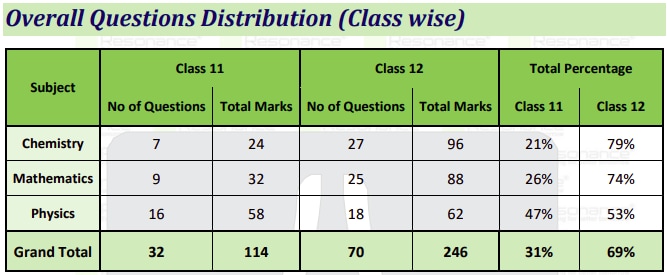
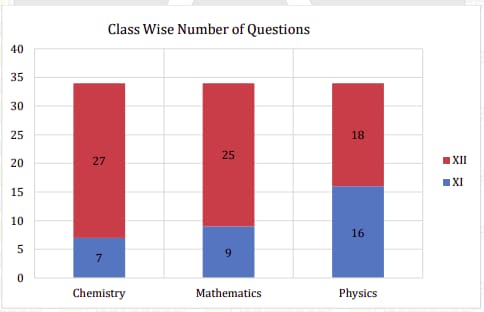
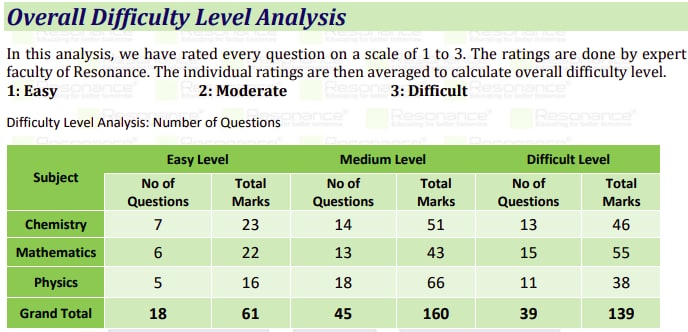
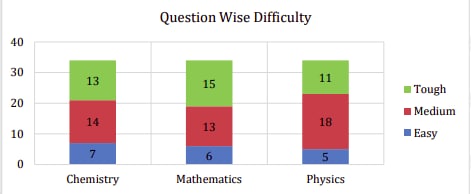
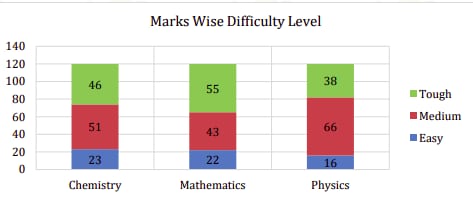

JEE Advanced 2024 Analysis by Resonance
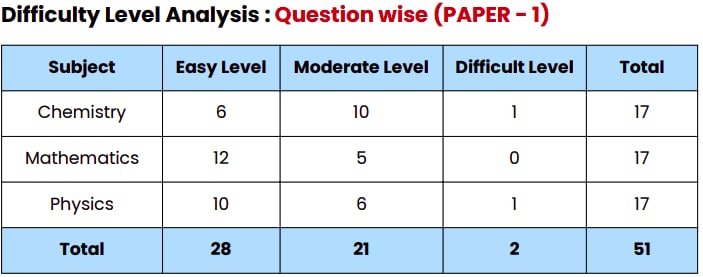
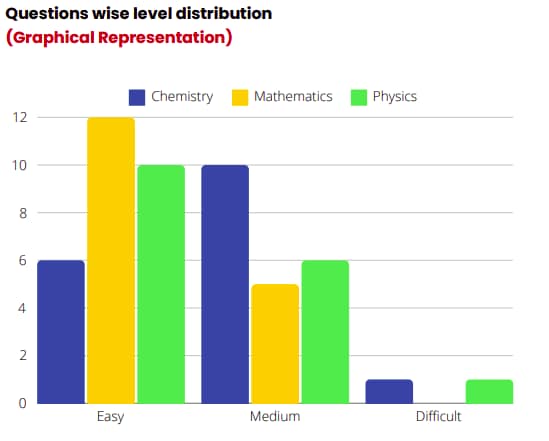
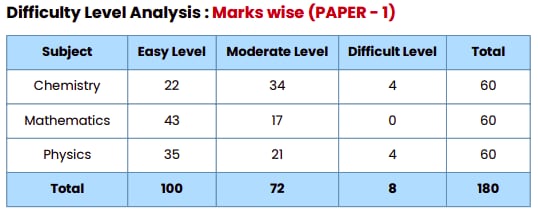
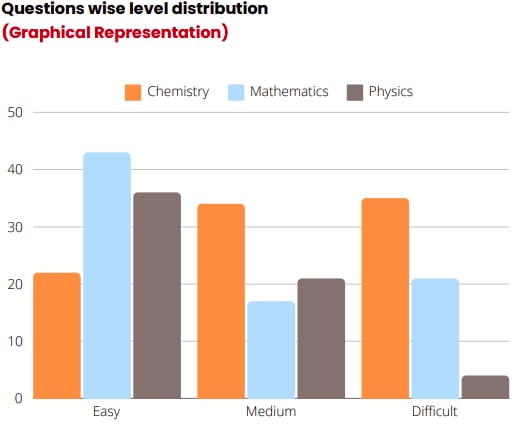
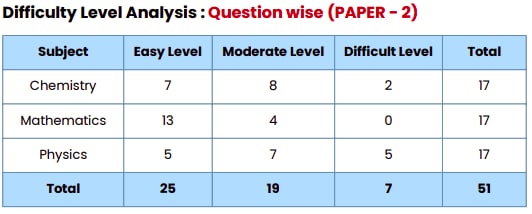
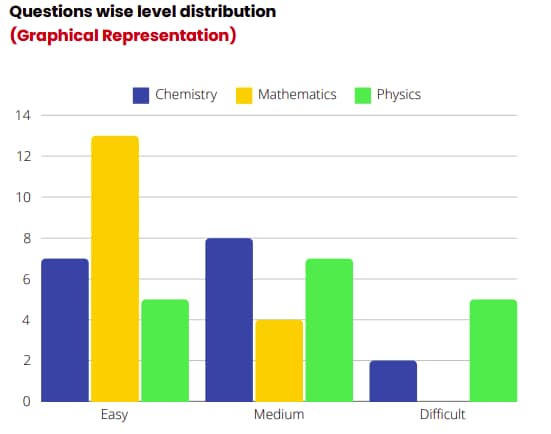
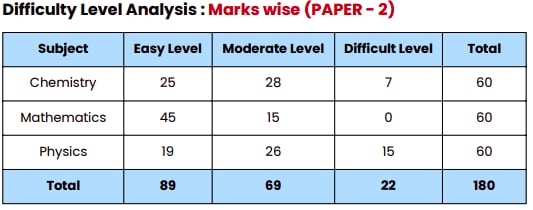
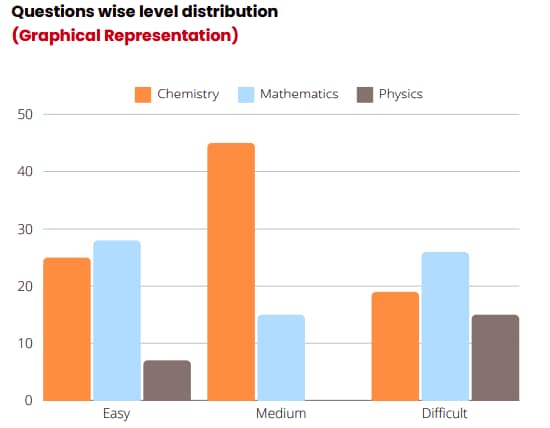
National level exam conducted by VIT University, Vellore | Ranked #16 by NIRF for Engg. | NAAC A++ Accredited
98% Placement Record | Highest CTC 81.25 LPA | NAAC A++ Accredited | Ranked #62 in India by NIRF Ranking 2025 | JEE & JET Scores Accepted
The pattern for JEE Advanced 2024 Paper -1 by Mr Ajay Kumar Sharma, National Academic Director, Engineering Aakash Educational Services Limited is as follows:
The paper consists of three subjects: Physics, Chemistry, and Mathematics. Each subject is worth 60 marks, making a total of 180 marks for the paper.
*Section-1: Single Correct Type*
- 4 questions
- Correct answer: +3 marks
- Incorrect answer: -1 mark
*Section-2: Multi-Correct Type*
- 3 questions
- Partial marking is allowed
- Correct option: +4 marks
- Incorrect option: -2 marks
*Section-3: Numerical Value Based*
- 6 questions
- Correct answer: +4 marks
- No penalty for incorrect answers
*Section-4: List Type Questions*
- 4 questions
- Correct answer: +3 marks
- Incorrect answer: -1 mark
According to student feedback, the difficulty level of the paper was moderate to difficult. Mathematics and Chemistry were particularly challenging, while Physics was of moderate difficulty.
This marking scheme is designed to encourage careful consideration of each answer, as incorrect responses can result in penalties. It also rewards candidates for correct answers, with partial marking available for certain question types.
The difficulty level of JEE Advanced 2024 Paper 2 was higher compared to Paper 1. Paper 2 consisted of 51 questions, with 17 questions each in Mathematics, Physics, and Chemistry, amounting to a total of 180 marks. Mathematics was notably tough, Chemistry maintained a moderate level of difficulty, and Physics ranged from moderate to difficult.
JEE Advanced exam date | JEE Advanced question paper |
JEE Advanced 2023 June 04 Shift 1 | JEE Advanced 2023 Paper 1 question by Vedantu question |
| JEE Advanced 2023 Paper 1 question by Career Point Kota paper | |
| JEE Advanced 2023 Paper 1 question by Mohit Tyagi | |
JEE Advanced 2023 June 04 Shift 2 | JEE Advanced 2023 Paper 2 question by Vendantu |
| JEE Advanced 2023 Paper 2 question by Career Point Kota | |
| JEE Advanced 2023 Paper 2 question by Mohit Tygai |
Candidates can check the JEE Advanced Shift 1 and 2 analysis here. Below is the JEE Main analysis based on examinees' viewpoint.
Mathematics paper was tough compared to Chemistry and Mathematics.
JEE Advanced paper 1 was easy compared to paper 2.
Questions were based on Matrices in mathematics. Moreover, questions from thermodynamics were asked in physics.
Questions in Physics were based on thermodynamics, modern physics, and optics.
According to Ramesh Batlish, students found the overall level of paper Moderate to Difficult level but not easy. Some students have reported Physics and Chemistry were Moderate, but Maths was relatively difficult. No mistakes reported till now as the complete paper is yet to be analyzed. The total mark of Paper-2 was 180 which is the same as last year.
Subject | Important topics | Difficulty level |
Chemistry | Organic & Physical Chemistry, Chemical Kinetics, Ionic & Chemical Equilibrium, Electrochemistry, Thermodynamics, Aryl & Alkyl halides, Amines, Polymers, Biomolecules, Oxygen containing Compounds | Moderate |
Physics | Wave & Sound, Wave Optics, Fluids, EM Waves, Thermodynamics, Modern Physics, Current Electricity, Kinematics, Gravitation, Electrostatics | Moderate |
Mathematics | Functions, Differential Equations, Inverse Trigonometric functions, Differentiability, Vectors, 3D Geometry, Application of Derivatives, Complex Numbers, Matrices, Circle Permutation & Combination and Probability | Tough |
According to the experts of ATP Star Kota, the overall difficulty level of JEE advanced is moderate to difficult. Physics was easy compared to Chemistry and mathematics. Below are the distributions of the difficulty level and weight of questions.
Difficulty level:
Subject | Difficulty level |
Physics | Easy to Moderate |
Chemistry | Moderate to difficult |
Mathematics | Difficult and lengthy |
Weightage of questions:
Subject | Topics | Weightage of question |
Physics | Heat and Thermodynamics | 4 |
Optics | 3 | |
Mechanics | ||
Chemistry | Organic | 7 |
Reaction based | 6 | |
Physics Chemistry | 5 | |
Inorganic | 5 | |
Mathematics | Vector & 3D | 1 |
Sequence and Series | 1 | |
Trigonometry | 1 | |
Calculus | 5 | |
Probability | 2 | |
Binomial | 2 |
According to the FIITJEE experts and students the overall level of paper Moderate to Difficult level but not easy. Some students have reported Physics was Easy, Chemistry was Moderate, but Maths was relatively difficult.
Subjects | Important Topics | Difficulty Level |
Chemistry | Chemical Kinetics, Ionic & Chemical Equilibrium, Electrochemistry, Atomic Structure. Thermodynamics (with more than one question). In Organic Chemistry, questions mostly asked from Amines, Polymers, Biomolecules, Oxygen containing Compounds | Moderate |
Physics | Kinematics, Thermodynamics, Modern Physics, Capacitors, Current Electricity, Kinematics, Gravitation, Optics, Electrostatics. | Easy |
Maths | Functions, Matrices, Ellipse, Statistics & Probability. Some good questions were asked from chapters of Probability, Complex Numbers, 3-D Geometry, Parabola. | Tricky and lengthy |
Mr. Nitin Vijay shared the JEE Advanced 2023 shift 1 and 2 analysis. According to NV sir, Paper I was relatively easier than Paper II, and as a relief to the aspirants, the total number of questions was brought down to 102 as compared to 108 questions asked the previous year for the same total of 360 marks. Where Paper II had a difficult mix of Physical and Organic Chemistry, it also had paragraph-style Integer value questions which were different as compared to Paper I. Looking at subject-wise analysis Mathematics was the most difficult of the 3 subjects with tricky and lengthy questions. Physics was comparatively easy and moderate with a focus on Kinematics, Thermodynamics, Modern Physics, Capacitors, Current Electricity, Gravitation, Optics, and Electrostatics. Overall, this year’s paper was slightly easier than the previous year which is leading to speculations that the cut-off might go higher this year.
Frequently Asked Questions (FAQs)
The JEE Advanced 2026 Paper Analysis will be released soon after the exam, which will be conducted by IIT Roorkee.
IIT Roorkee will set the JEE Advanced paper in 2026.
As per the previous year analysis, the difficulty level of JEE Advanced is moderate to difficult.
On Question asked by student community
HELLO,
If you are from General category with 57 percent in 12th then to appear for JEE Advanced you need to be in top percentile of your board as the eligibility for JEE advanced you need at least 75 percent in 12th or in the top 20 percentile of your
HELLO,
Repeating class 11th does not affect your JEE eligibility .
For JEE Main there is no age limit , you can appear if you have passed or are appearing in class 12th in the eligible year , so repeating the class 11th will not affect your eligibility.
JEE Advanced
Hello,
You passed your Class 12 (Intermediate) from UP Board in
2024
.
As per
JEE Advanced rules
, a candidate can appear
only in the year of Class 12 passing and the next consecutive year
Eligible years for you were 2024 and 2025
You already appeared in 2025
2026
Hello,
Yes, many IITs now offer specialization BTech programs in AI and data science/engineering, separate from core CSE, while also providing AI/ML/robotics as electives or minors within CSE/other branches, with admission via JEE Advanced, but you'll find specific "robotics engineering" branches more at institutions like IITs/NITs, though IITs integrate robotics
Hello,
You can download the IIT JEE Last 5 Years Chapterwise PYQ's from the Careers360 website. Practising these papers will helps you to understand the exam pattern, to identify the important topics, to improve time management, and overall it enhances your exam preparation.
LINK: https://engineering.careers360.com/articles/jee-main-question-papers
Hope it helps!
Among top 100 Universities Globally in the Times Higher Education (THE) Interdisciplinary Science Rankings 2026
Recognized as Institute of Eminence by Govt. of India | NAAC ‘A++’ Grade | Upto 75% Scholarships | Application Deadline: 15th Jan
UG Admissions Open 2026 | Highest CTC 52 LPA | Average CTC 9.09 LPA | 60+ Collaborations with the world's best Universities
Institute of Eminence (IOE) by Govt. of India | Merit Based Scholarships | Ranked #11 by NIRF | Last Date to Apply: 16th Mar'26
India's youngest NAAC A++ accredited University | NIRF rank band 151-200 | 2200 Recruiters | 45.98 Lakhs Highest Package
Highest CTC 44.14 LPA | UGC Approved | 1600+ Recruiters | 100% Placement